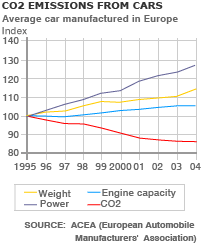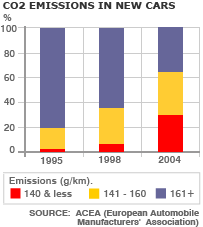EU struggle over mandatory caps on car emissions
 Environmentalists have expressed grave concern that the European Commission could be about to drop plans to ensure that new cars produce a quarter less carbon dioxide by 2012. The Commission had been expected this week to announce plans to force car makers to meet this tough target, despite warnings from the industry that it would push up prices and put jobs at risk.
Environmentalists have expressed grave concern that the European Commission could be about to drop plans to ensure that new cars produce a quarter less carbon dioxide by 2012. The Commission had been expected this week to announce plans to force car makers to meet this tough target, despite warnings from the industry that it would push up prices and put jobs at risk.The move would have been a concrete step towards the "post-industrial revolution" the Commission called for two weeks ago, to tackle climate change and to transform the world's car markets (earlier post).
Political support for capping carbon dioxide (CO2) emissions from cars quickly grew as European Commission President Jose Manuel Barroso and two environment ministers from auto powerhouse Germany publicly backed binding EU limits earlier this week.
But a clash between Environment Commissioner Stavros Dimas (earlier post), who supports a binding cap on CO2 emissions of 120g/km by motor vehicles, and Industry Commissioner Guenter Verheugen, who opposes binding legislation, has blocked the proposals from going forward.
The EU has long been saying that cars should emit on average no more than 120g of CO2 per kilometre, though the deadline for reaching the target has been steadily slipping. In 1999, car makers agreed to aim for 140g/km by 2008 - a 25% reduction from the 1995 level of 185g/km - but had reached only 162g/km by 2005.
Open letter
The delay has prompted a coalition of 10 green NGOs to write an open letter [*pdf] to the Commission:
"The 120 g/km target is feasible. It is a fleet-average target that can be met through instruments that require neither individual car makers nor individual cars to meet it. It is not just about deploying complicated and advanced new technologies, it is just as much about using existing technologies and stopping or reversing the trend towards ever-more powerful and faster cars (for example fitting cars with smaller engines is a very effective and cost effective measure).Transport has the potential to knock off course Europe's efforts to reduce greenhouse gas emissions. It generates more than one fifth of the overall emissions, and is the only sector where emissions have been dramatically rising in recent years - by 26% between 1990 and 2004.
Failing to announce legislation ensuring that the 120g/km target is met would seriously undermine the credibility of the Commission. It would also mean that the Commission fails to deliver on its first real-world policy following the announcement on 10 January of a greenhouse gas reduction target of at least 20% by 2020." -- International Friends of Nature, Climate Action Network Europe, Friends of the Earth Europe, European Environmental Bureau, European Public Health Alliance – Environment Network, WWF European Policy Office, BirdLife International, Greenpeace European Unit, CEE Bankwatch Network.
Some quick facts about EU cars and CO2 emissions:
 Fiat, Citroen and Renault have reduced CO2 emissions far more than VW, BMW and Volvo (overview per brand)
Fiat, Citroen and Renault have reduced CO2 emissions far more than VW, BMW and Volvo (overview per brand)- Their success is partly due to selling more efficient diesel cars
- Manufacturers say there has been "no clear demand" from consumers for fuel-efficiency
- Some SUVs emit more than 360g of CO2 per kilometre
- Makers of SUVs and sports cars could be driven out of business by a 120g/km limit
Better engines, better fuel
On Wednesday the European Commission was to have announced two measures, both of which have now been delayed:
 biomass :: bioenergy :: biofuels :: energy :: sustainability :: climate change :: global warming :: greenhouse gas emissions :: CO2 :: European Commission :: European Union ::
biomass :: bioenergy :: biofuels :: energy :: sustainability :: climate change :: global warming :: greenhouse gas emissions :: CO2 :: European Commission :: European Union ::The plan to impose mandatory restrictions on CO2 emissions from passenger cars would have obliged car makers to use technology to make cars more efficient, or to sell cars with smaller engines.
The other measure - a review of the fuel quality directive - would have obliged oil companies to produce fuels that released 10% less CO2 by 2020, taking into account emissions from all stages of the production and consumption process "from well to wheel".
This would provide an incentive for the rapid introduction of second generation biofuels, which are not yet available on an industrial scale.
To complete the package of proposals, the Commission was due to make a statement on existing plans for an "integrated approach" to reducing CO2 emissions from cars, covering things such as taxation, labelling, reducing congestion and changing drivers' behaviour.
Commission spokeswoman Pia Ahrenkilde Hansen said on Tuesday that one reason for the delay was the problem of ensuring coherence between all the various proposals. The measures also have to be consistent with the papers mapping out the proposed low-carbon revolution published on 10 January.
Biofuel debate
One of these papers calls for biofuels to have a 10% share of the fuel market by 2020, but the proposed change to the fuel quality directive "results in completely different numbers", according to Peter Tjan, secretary general of the European Petroleum Industry Association.
Jos Dings of the Transport and Environment pressure group foresees a struggle between two different approaches to biofuels.
The 10% share can currently be achieved by production of any biofuels, including varieties whose manufacture entails sizeable CO2 emissions. This approach is favoured by the agricultural lobby.
By contrast, the amended fuel quality directive would put a premium on second-generation biofuels because these allow a big reduction in net CO2 emissions per unit of energy contained in the fuel.
Both the fuel and car industries warn of higher costs to the consumer if the Commission's plans go ahead.
Sigrid de Vries of the European Automobile Manufacturers Association (ACEA) says one study has estimated the cost of a small car could increase by between 2,500 and 4,000 euros if the 120g/km limit is enforced - though other studies are less pessimistic.
Other measures, such as reducing traffic congestion, would achieve the same reduction in emissions far more cheaply, she says.
EU Summit in March
But Jos Dings argues that all available mechanisms for reducing emissions from transport have to be grasped with both hands. The 120g/km limit is absolutely key, he says, because it promises such a big reduction in emissions - 25% within a few years.
He points out that any increase in the cost of the car would be more than offset over its lifetime by savings on fuel, thanks to the engine's greater efficiency.
Stephan Singer, head of climate and energy policy for WWF in Brussels, also hopes that Mr Barroso will not waver, but is a little less gloomy than Jos Dings.
The key task for the Commission now, he points out, is to ensure that the next EU summit in March supports the big shift to a low-carbon economy, outlined on 10 January, with its headline goal of a minimum 20% reduction in greenhouse gas emissions by 2020.
If the prime ministers and presidents sign up to that, he says, tough action to rein in emissions from two sectors outside the EU's carbon emissions trading scheme - transport and construction - will become inevitable.
Germany's positions
Europe's largest car making nation plays a key role in the debate, but here too key players have clashed: "Voluntary curbs by the industry have failed. Now we need clear and legally binding targets," Environment Minister Sigmar Gabriel, a Social Democrat in conservative Angela Merkel's coalition cabinet, told the EU parliament.
"The automobile industry must make a greater contribution to lowering emissions," SPD Transport Minister Wolfgang Tiefensee told reporters, adding: "We will not be able to get around having binding legal limits."
But he proposed having different ceilings for different classes of cars so that a blanket set of rules would not put the squeeze on German premium carmakers such as BMW
Conservative Economy Minister Michael Glos also opposed blanket rules and was more circumspect about EU limits: "We must ensure that the Commission does not deliver targets on reducing car emissions that would be tough for Germany to fulfill," he told an energy conference in Berlin.
Carmakers have urged Brussels not to impose CO2 limits, saying politicians had failed to shift taxation to foster clean cars at a time that consumers did not want to pay more for fuel efficient cars and had no financial incentives to do so.
More information:
European Federation for Transport and Environment: NGOs call on Barroso to legislate on cars and climate - Jan. 24, 2007.
European Federation for Transport and Environment: Regulating fuel efficiency of new cars (background briefing) [*pdf]
EUPolitix: EU deadlock on car emissions - Jan. 23, 2007
Reuters: Momentum grows for EU cap on cars CO2 output - Jan. 23, 2007
Reuters: Germany seeks binding rules for cars' CO2 emissions - Jan. 23, 2007
Euractiv: 'Les constructeurs travaillent à développer des autos plus sobres' - Laurent Masson, Moteur Nature, Open letter, - Jan. 24, 2007
New Scientist: Europe mulls mandatory emissions limits for cars - Jan. 22, 2007
 -------------------
-------------------
 Spanish company Ferry Group is to invest €42/US$55.2 million in a project for the production of biomass fuel pellets in Bulgaria.
The 3-year project consists of establishing plantations of paulownia trees near the city of Tran. Paulownia is a fast-growing tree used for the commercial production of fuel pellets.
Spanish company Ferry Group is to invest €42/US$55.2 million in a project for the production of biomass fuel pellets in Bulgaria.
The 3-year project consists of establishing plantations of paulownia trees near the city of Tran. Paulownia is a fast-growing tree used for the commercial production of fuel pellets.









0 Comments:
Post a Comment
Links to this post:
Create a Link
<< Home